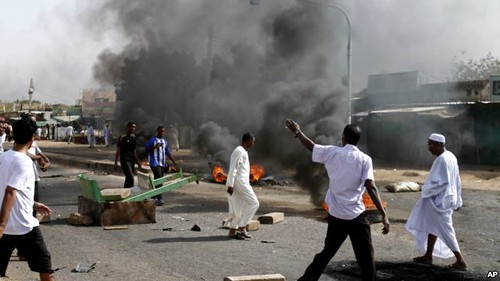
People walk around fires in Sudan where unrest over rising fuel prices has resulted in dozens of deaths. Some protesters are out for regime-change., a photo by Pan-African News Wire File Photos on Flickr.
FRIDAY 24 JANUARY 2014
Sudan’s parliament quizzes government on recent shortages in bread and gasoline
January 23, 2014 (KHARTOUM) – The Sudanese parliament questioned the oil minister Makkawi Mohamed Awad on the causes behind recent shortage of gasoline and cooking gas and precautionary measures taken by his ministry to ensure that this crisis will not be repeated in the coming period.
Lawmakers also probed minister of commerce Osman Omer Al-Sharif on the bread scarcity and current levels of strategic commodities to ensure supply of wheat.
Al-Sharif, disclosed in a meeting with the parliament deputy speaker, Samia Ahmed Mohamed and head of the parliamentary subcommittee on Finance and Economy Salem Al-Safi, that bread crisis was caused by low productivity of some flour mills and not scarcity of wheat, stressing that the problem is now over.
The MPs urged the oil minister to secure flow of cooking gas to all states and remove price differentials.
Makkawi affirmed that they developed certain measures for that purpose, assuring MPs on the level of strategic stock of petroleum products.
The minister disclosed that when the gasoline shortage occurred there was enough reserve for a month, saying there must be a balance between production and consumption.
The head of the parliamentary subcommittee on Energy, Omer Adam Rahma, said in press statements that the oil minister affirmed that gasoline shortage has been resolved and underscored their continuous efforts to secure fuel and other basic commodities.
He went on to say that the gap between consumption and production of gas is filled in collaboration between Ministry of Finance, Ministry of Oil and the central bank.
Rahma emphasized that that despite the fuel, Sudan continues to export it to neighboring countries.
“There will neither be shortage of gasoline nor queues in the coming period”, he added.
Several Sudanese states including the capital Khartoum recently witnessed sharp shortages in bread, cooking gas, and gasoline as large numbers of people queued in front of bakeries and gas cylinders distribution shops.
Bakery owners said that they are getting 50% less flour quotas assigned to them.
A dispute occured last year between Khartoum state government and bakeries union which is part of the union of the industrial chambers on bread price following the recent economic measures.
The bakeries union proposed selling 3 loafs of bread instead of 4 loafs at one pound or reducing bread weight which is determined by the state at 70 grams. However, the government rejected the proposal and maintained the price and weight of bread.
Sudan currently imports more than 2 million tons of wheat annually at a cost of $900 million.
Last September the government announced the second batch of subsidies cut but kept its support to prices of the bread.
The reduction of subsidies on basic commodities is part of an austerity plan introduced in July 2012 to reduce the government spending by $1.23 billion.
The measures led to countrywide demonstrations in which rights groups say that over 200 Sudanese were killed.
(ST)
No comments:
Post a Comment